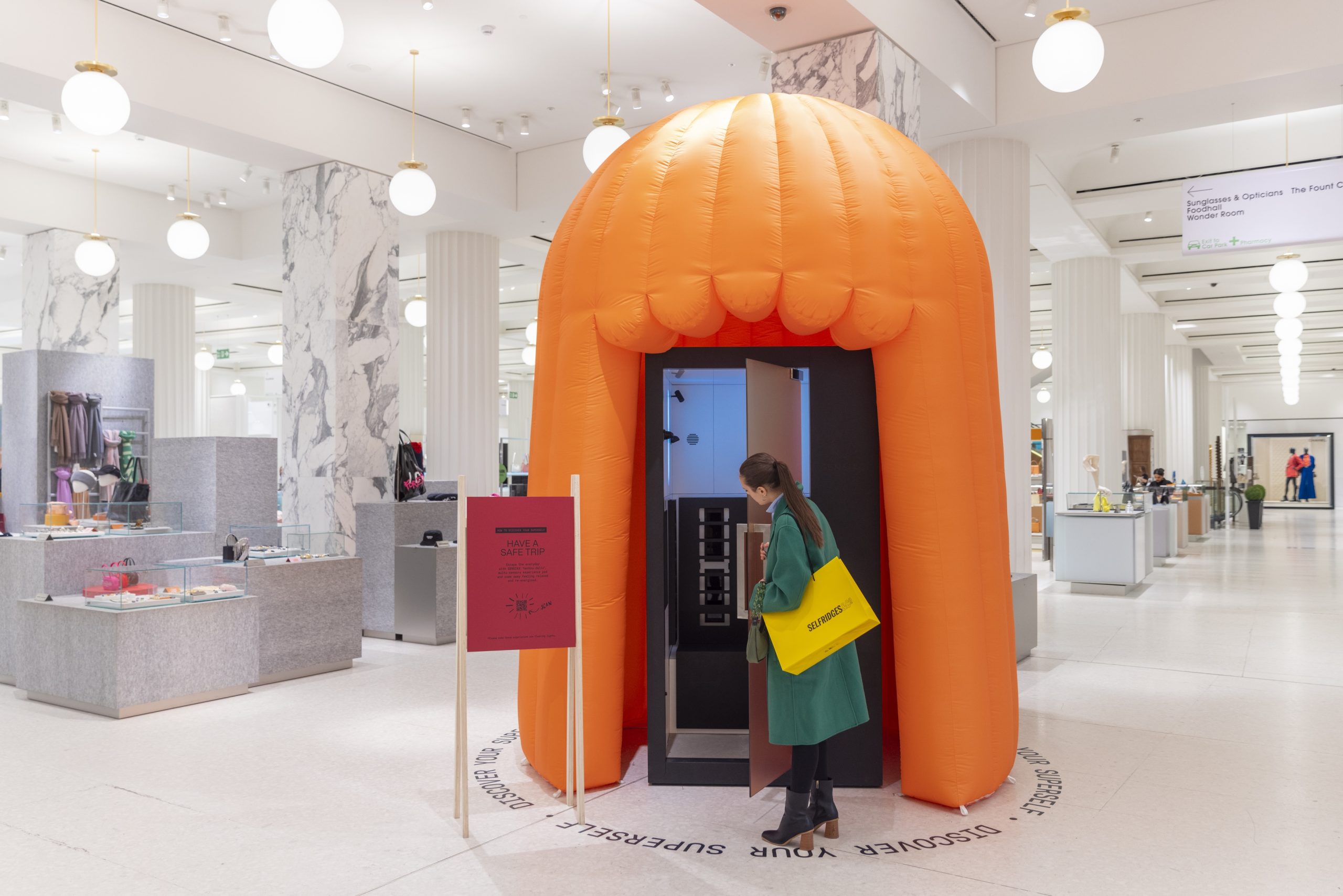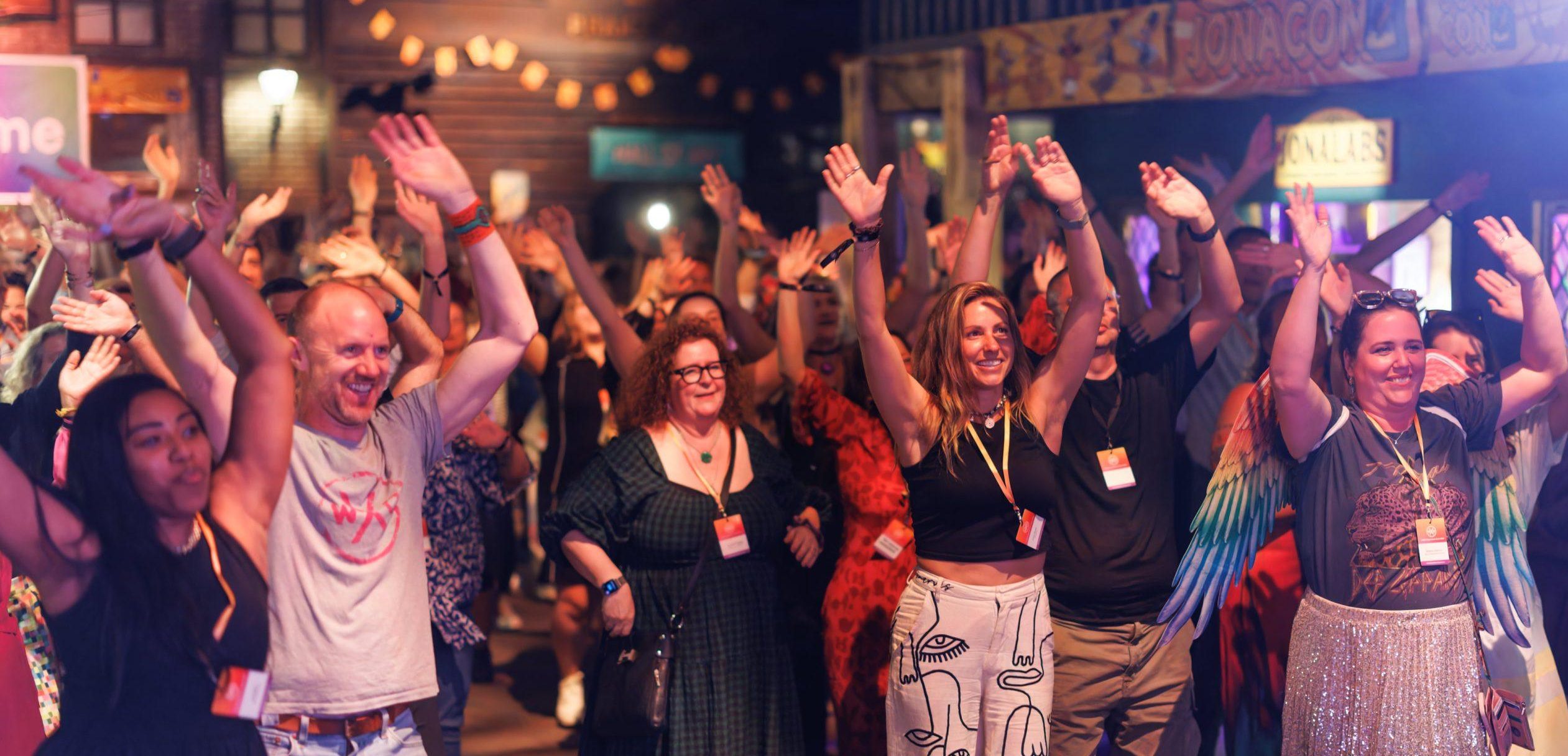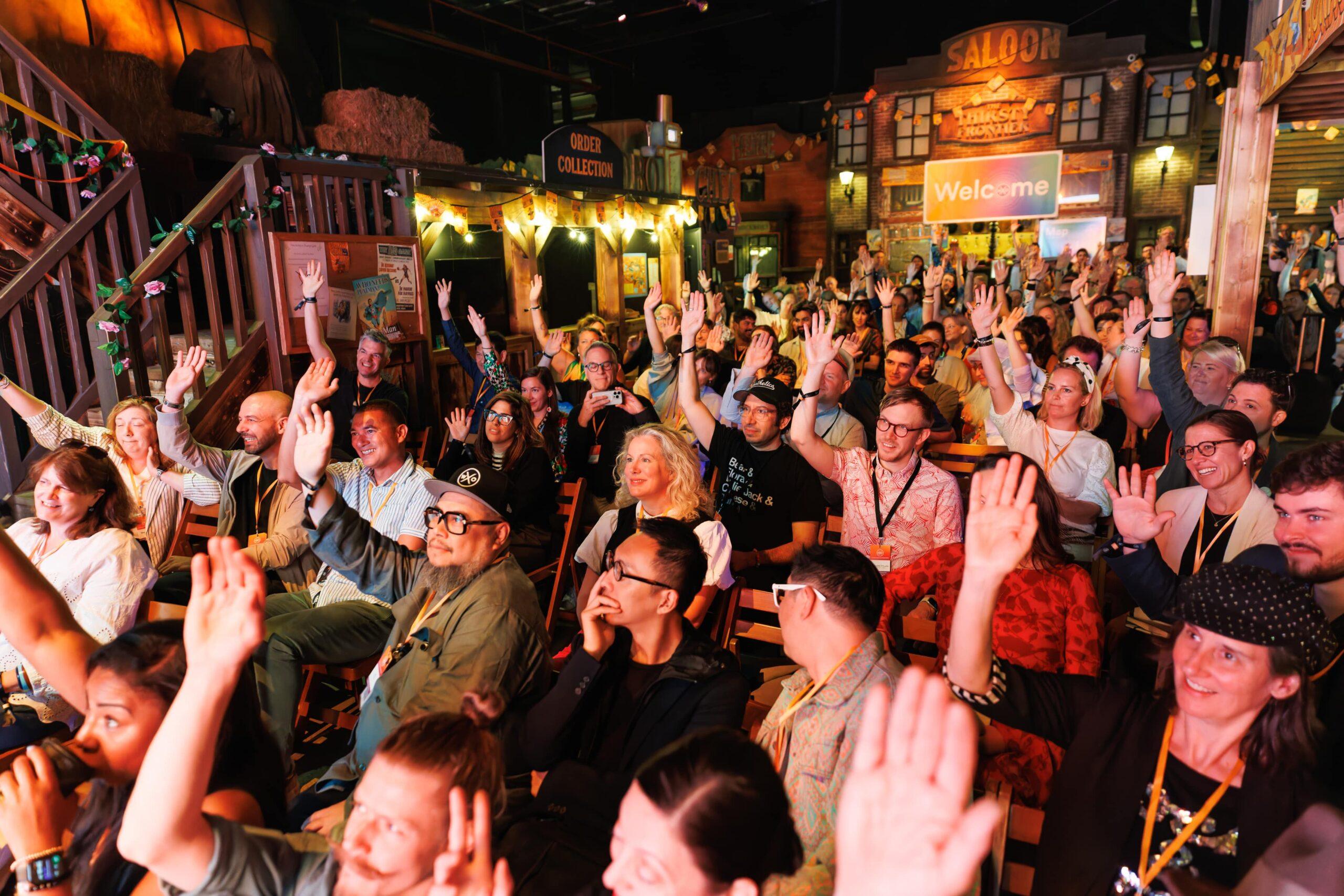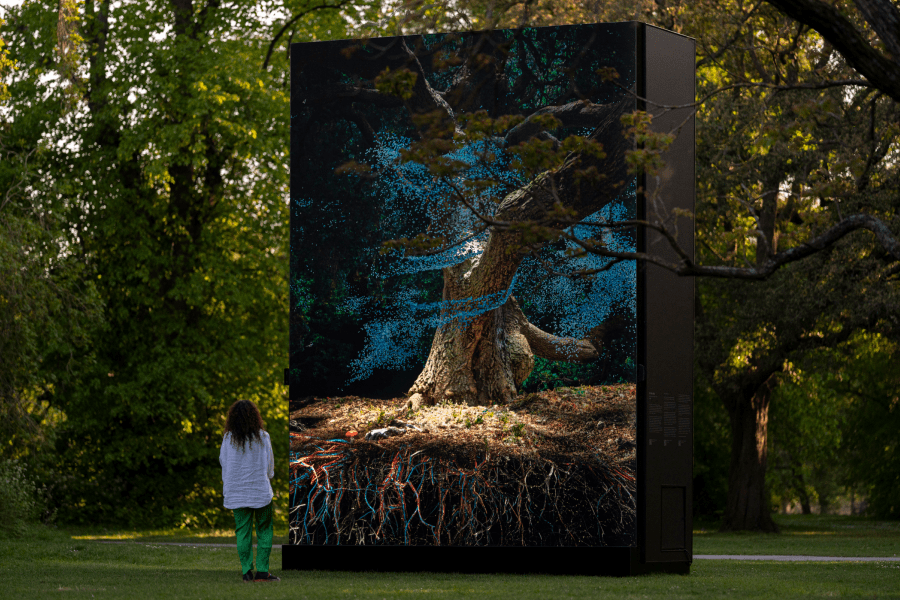Welcome to the WXO Experience Safari: your guided tour through the best experiences around the world, tailored for experience designers.
Put together using recommendations from WXO Members, each Safari covers our favourite experiences in each city – plus, why they’re interesting to experience designers, and what they might teach us about creating even better experiences.
This special experiential retail London Edition was compiled with contributions from WXO members including Joe Pine. If you’d like to submit your own recommendations – for London, or for another destination – fill in our Experience Safari form here.
With shoppers heading online in their droves during the pandemic, the need for traditional bricks-and-mortar stores to deliver memorable shopping experiences has never been greater. Physical stores still serve an important purpose within the retail landscape, acting as brand showrooms where shoppers can interact with products IRL before committing to them. Brands that are excelling in the post-pandemic retail arena are those that offer a hybrid model of online stores backed up by a bricks-and-mortar flagship focused on test-driving products.
With increasing competition for consumer spend, brands need to go all out to give their customers an engaging, interactive experience at physical stores, to make the trip worth getting off the sofa for. We’ve scoured the high street to bring you 10 stores that are nailing experiential retail right now, offering customers experiences including confidence coaching, in-store blow dries, lighting tutorials and cookery courses. The high street is far from dead – it’s shape-shifting in fascinating ways to lure shoppers back with brio.
Selfridges
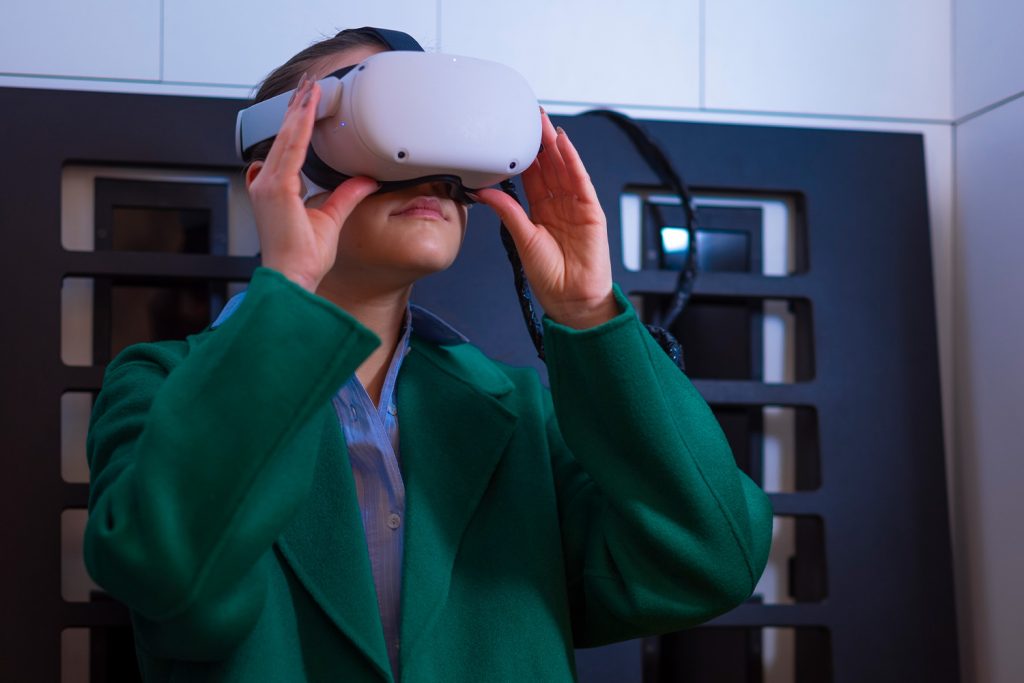
Putting the self-care into Selfridges, the luxury department store is offering a fresh take on retail therapy via its new Superself project, which promises to take shoppers on a voyage of self-discovery. Superself, created in collaboration with The Stack World, includes confidence coaching, breathwork sessions and hypnotherapy. The project is the first in a series of ventures based around the store’s theme for 2022, Superfutures, which invites guests to play their part in co-creating the future.
We’re reconsidering retail therapy, connecting our customers with self-development therapy and coaching sessions – from sex therapy to confidence coaching to gut health and nutrition. We’re bringing to the fore the myriad ways Selfridges can help you become your Superself – through fitness, sustainability, beauty, food and creativity.
Emma Kidd, acting creative director of Selfridges
Encouraging customers to ‘live brighter’, we love the sound of the Sensory Reality Sensiks mood-boosting pod, which guests can enter for an LSD-free psychedelic trip that harnesses the power of VR to stimulate the senses, optimise mental wellbeing and facilitate a deeper connection with the self. Temperature, airflow, sound, light and smell combine with VR, creating a hyper-realistic simulated reality that activates the brain into ‘participation mode’. It’s the first time this tech has been available for public consumption – the pod has previously been used in clinical trials for treating addiction, PTSD and anxiety.
Samsung
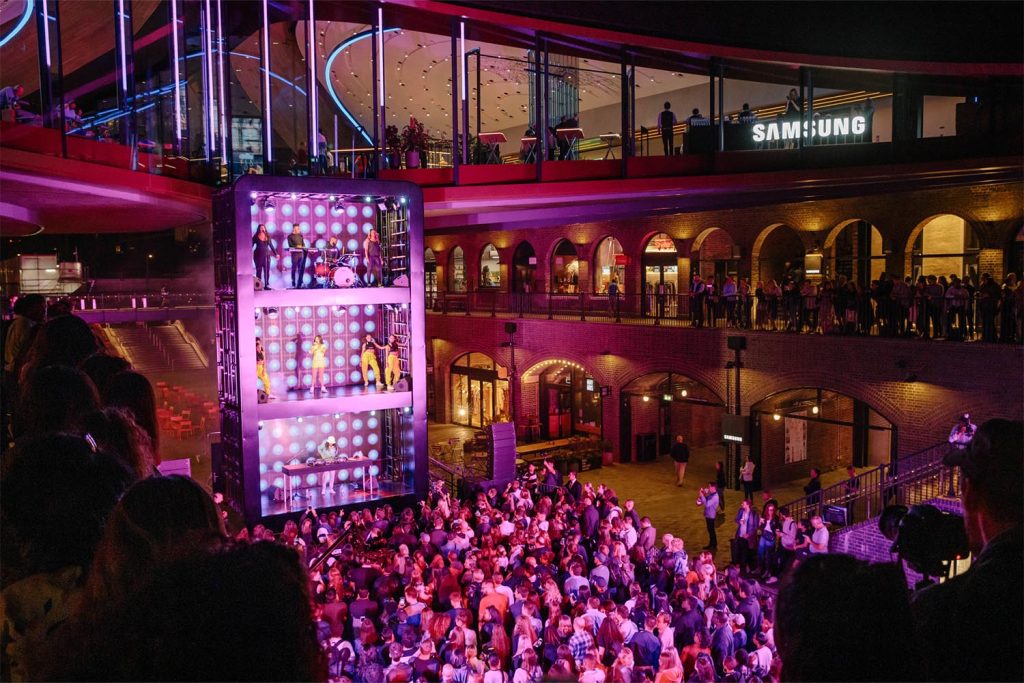
More experience space than shop, tech giant Samsung’s 20,000-square foot King’s Cross venue – a stone’s throw from Tom Dixon in Coal Drops Yard – is essentially an adult playground, allowing visitors to get to grips with the brand’s latest innovations first hand. Among the free interactive experiences is a ‘digital cocktpit’: the world’s first seamlessly connected driving experience that includes smart home connectivity controls, enabling the user to check inside their fridge or answer the doorbell from their car.
Visitors can also unleash their inner artist at the venue, creating virtual street art on a 10-metre-wide screen across a range of London backdrops, which can be shared on social media. Proving romance didn’t die with web 2.0, wannabe Romeos can leave AR notes under the ‘kissing point’ for their beloveds to discover. The innovative space also features a café and customer support lounge.
With Samsung KX, we’re creating a space for the local community, but we’re going about it in a unique way,” said Y H Lee, global CMO of Samsung Electronics. “This destination is an incredible blend of local culture, face to face learning and innovation. We have redesigned our brand experience spaces to give consumers what they want – more dynamic, flexible locations where exploration is endless.
Y H Lee, global CMO of Samsung Electronics
Situ Live
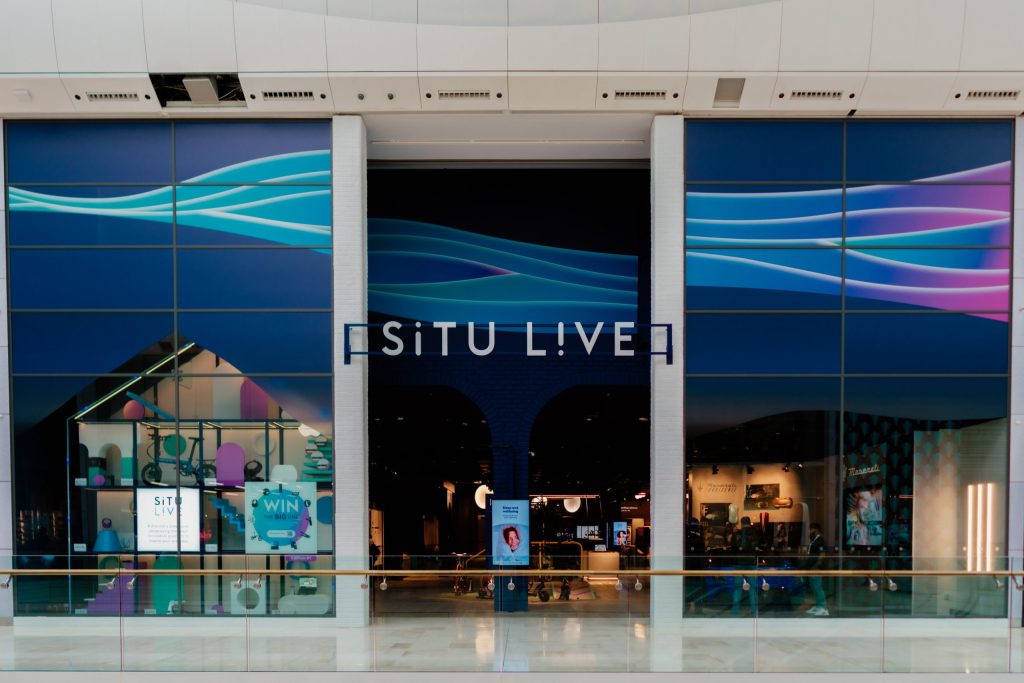
Billed as a discovery playhouse, Situ Live in Westfield is a revolutionary retail concept offering shoppers an experience-led journey that combines product discovery, innovation, theatre and demonstrations with an easy route to purchase. Housed opposite the Apple store along the shopping centre’s ‘Innovation Alley’, visitors are taken on an interactive journey through constantly-evolving spaces. The content is curated around current trends and solving practical problems such as getting fit, sleeping better and being more productive. Working with leading brands like Maserati, Bosche, Oculus and Coravin, the store aims to transform the traditional retail model with a focus on discovery and exploration.
In the post-pandemic world, people are looking to retail, leisure and event experiences to create unique and lasting memories, which makes now the perfect time to launch Situ Live. We’ll be working with our brand partners to create an ever-evolving experiential retail experience, with a rolling programme of exclusive content and events. No two visits to Situ Live will be the same.
Warren Richmond, CEO of Situ Live
The shop’s lifestyle theatres and live demo areas include a fully working kitchen with snacks to try, a connected lounge, a fitness zone, relaxation areas for sleep and wellbeing, mobile working inspiration, and hands-on gaming technology. If shoppers spot a product they like, they can scan a QR code and add it to their favourites list, with the option of buying it online at home afterwards. This novel approach to physical retail allows shoppers to discover products IRL, while benefiting from the ease of buying them online.
Adidas
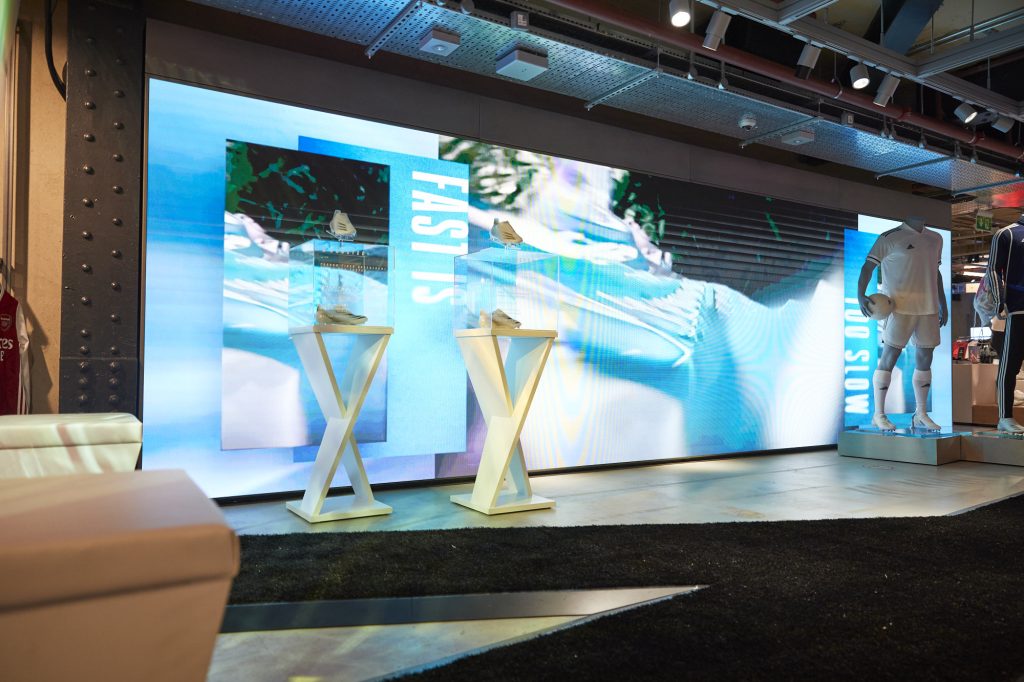
Keen to lure shoppers back post pandemic, the sportswear brand’s flagship store on Oxford Street wanted to set the standard for what an experiential retail installation could achieve. To achieve its goal, Adidas partnered with experiential retail specialists The Marketing Store and Immersive AV to create an interactive brand experience via an attention-grabbing semi-permanent installation.
Taking speed as a theme, to promote the launch of the Adidas x Ghosted football boot the design duo created a series of immersive environments throughout the store, portraying a physical representation of speed for shoppers to interact with. Among the installations was an automated lighting animation with nine transparent screens with images of footballer Mo Salah, which were illuminated sequentially to create the illusion of the striker sprinting through the store.
Brands pull out all the stops at events to achieve maximum engagement, and to see Adidas transcend those concepts into a retail environment demonstrates a real desire for them to be seen as innovators.
Adam Parry, editor of Event Industry News
Interactive content was also created for a ghost wall, displaying an animated visualisation of speed on a video wall. Users triggered generative content via movement sensors, creating an avatar that raced across the screen in real time.
Immersive AV accessorised Adidas mannequins with digital goggles, displaying a custom animation, and provided atmospheric lighting and audio around the store.
Burberry
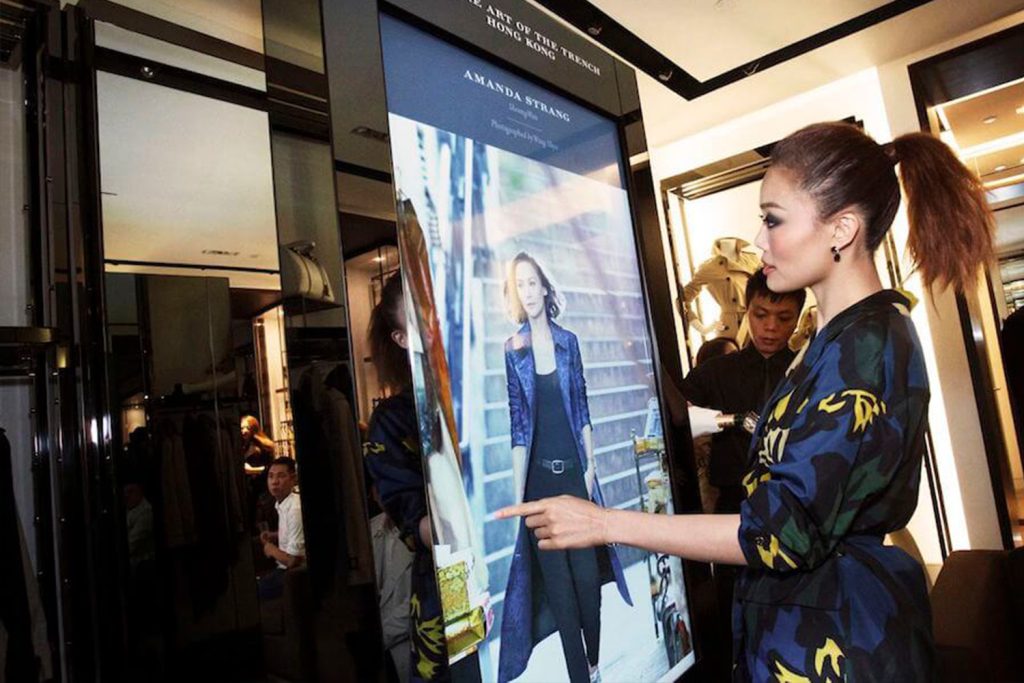
Proving that high fashion and experiential retail go hand in glove, Burberry’s Regent Street store – housed in a Grade II listed building, at 44,000ft set across four floors – makes use of radio-frequency identification technology, giving shoppers access to product info and catwalk looks via a series of screens. RFID tags have been placed in the garments and work with interactive mirrors to allow customers to see what they’d look like in the clothes. When items are tried on in the changing rooms, mirrors flip to show the clothes on the catwalk.
Our customers can experience every facet of the Burberry brand through immersive multimedia content exactly as they do online.
Angela Ahrendts, CEO of Burberry
With a 22ft high screen, 500 hidden speakers and a hydraulic stage, the space has become a showplace for the brand and a centre for promotional events, fashion shows and new collection launches. Keen to fuse the in-store and online shopping experiences, Burberry’s CEO, Angela Ahrendts told Vogue: “Customers can experience every facet of the brand through immersive multimedia content exactly as they do online.” The tech-forward brand has embraced augmented reality, allowing customers who search for Burberry’s Black TB bag or Arthur Check Sneaker on Google to view the items in AR.
Tom Dixon
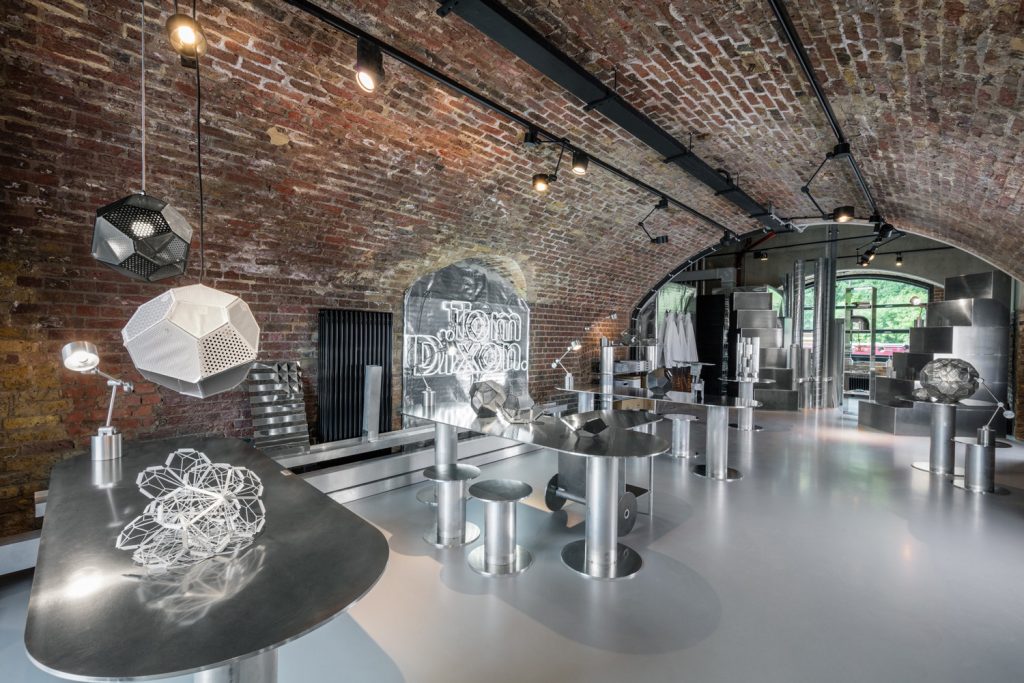
The Coal Office in Coal Drops Yard is a lighting and furniture shop-cum-haberdashery, perfumery and gift shop that hosts a series of interactive workshops at its creative space, The Factory, where ideas are tested and prototypes created, taking in lighting and electronics tutorials and clay and pickling workshops. Aiming to be a hub for the brand’s latest experiments and collaborations, the space bills itself as a multi-disciplinary platform for innovation and design.
We have a dedicated space that serves as a pre-production small batch manufacturing workshop where ideas can be tested out, prototypes created and a direct conversation with the customer can take place, as The Factory isn’t hidden deep in the recesses of the building; it’s the entrance to our shop.
Tom Dixon, British interior designer
Functioning as a working studio, the store combines a shop, workshop, office and restaurant under one roof, with plans afoot for a nightclub under the final arch. It also has a dedicated space for professionals such as architects, interior designers, retailers and dealers called The Trade Counter.
Dyson
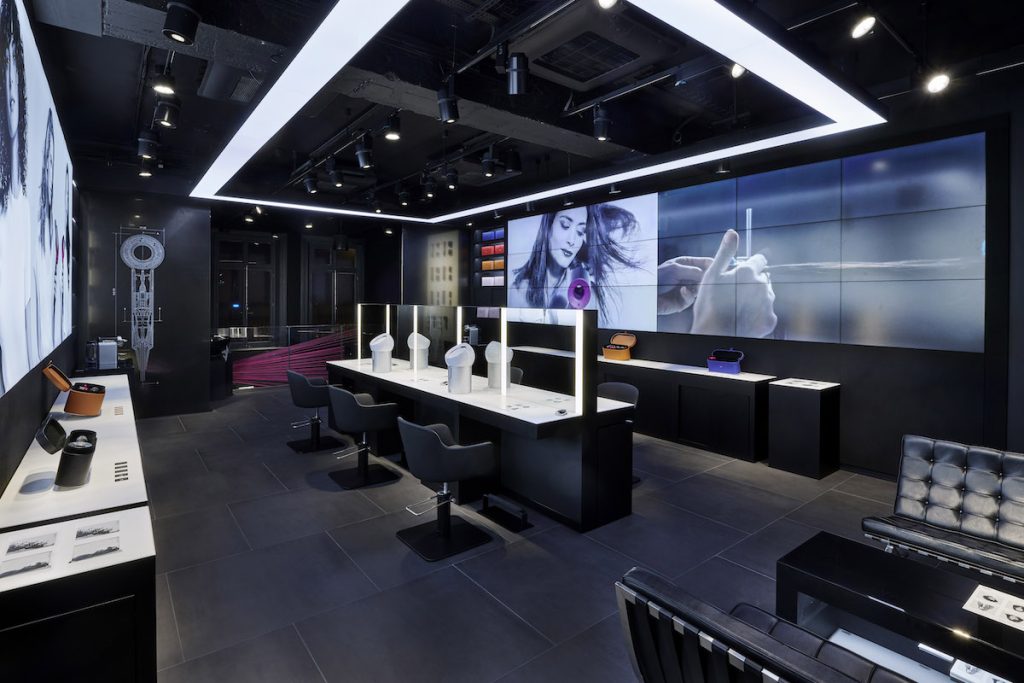
The Dyson Demo Store on Oxford Street – the only physical space owned by the brand – encourages shoppers to try before they buy, playing with all the latest devices before flexing their credit cards. Customers can interact with all of the items on display, giving cordless vacuums a go on strips of carpet while straightening their hair with Dyson’s Airwrap styler. Like Apple, Dyson has clocked onto the importance of personalisation and shoppers can create their own bespoke Airwrap styler tailored to their hair type, then have their initials embossed onto the case.
Proving how important the interactive element now is at bricks and mortar stores as a way of giving them a point of difference over online shops, the demo store is dedicated to trying and testing products rather than focusing on the hard sell. For £35 customers can even book a professional wash and blow dry with a Dyson stylist, using the brand’s cutting-edge haircare tech.
Nike Town
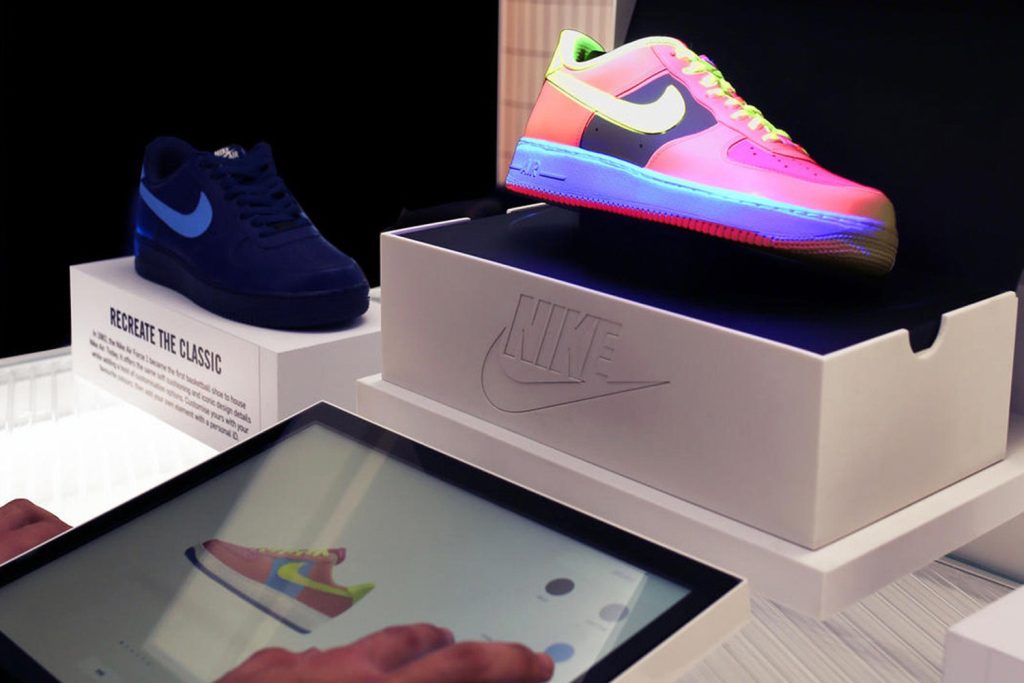
The sneaker emporium in Oxford Circus has an iD Direct Studio that uses video-mapping technology to allow shoppers to personalise a pair of Nike Air Force 1s in real time. During the creative process, you can project your chosen materials and colours onto a pair of trainers in the Nike iD configurator booth, giving you the power to see the design you’re crafting and the option to change it in real time with a swipe of an iPad. Once you’re happy with your bespoke design, the shoes are made in the Nike iD factory.
Helping runners to find their perfect fit, the store offers shoppers the chance to hop on a treadmill and enjoy a gentle jog in various pairs of trainers, while a camera analyses your gait and an assistant monitors your movements, so you walk away with the trainers best suited to your body and running style. In the US, the Nike experiences feature in the Nike app enables shoppers to book events, fitness classes and product customisation services, while foot-scanning technology Nike Fit uses a combination of machine learning, AI and recommendation algorithms to help shoppers find the best fit.
Apple
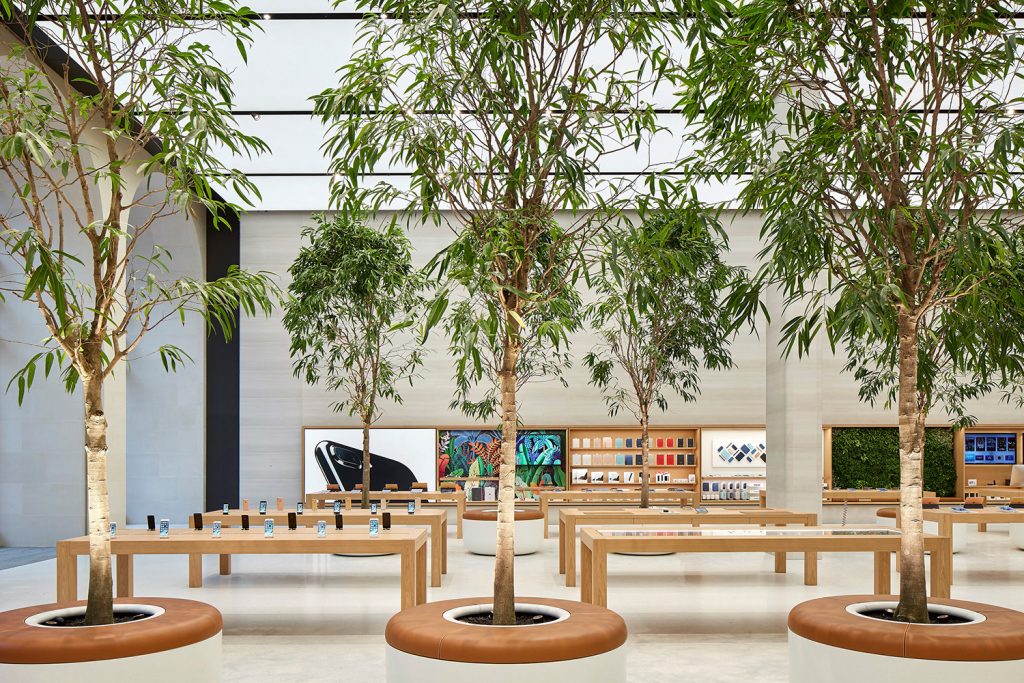
Early adopter Apple was blazing a trail with its Genius Bar service at its flagship store on Regent Street long before experiential retail became a buzzword. Recognising the importance of customisation as a way of connecting with their consumers, the store allows shoppers to customise their Macs, iPods, iPads and AirPods with emojis, initials and numbers, all for free.
Those seeking a deep dive into their new device can book a free one-on-one personal session with an in-store specialist, with sign language interpreters on hand. You can also customise your Mac to suit your needs, with more memory, additional storage or a turbo-charged graphics card, while the Apple Watch Studio allows you to create a customised Apple watch with a bespoke strap and case.
John Lewis
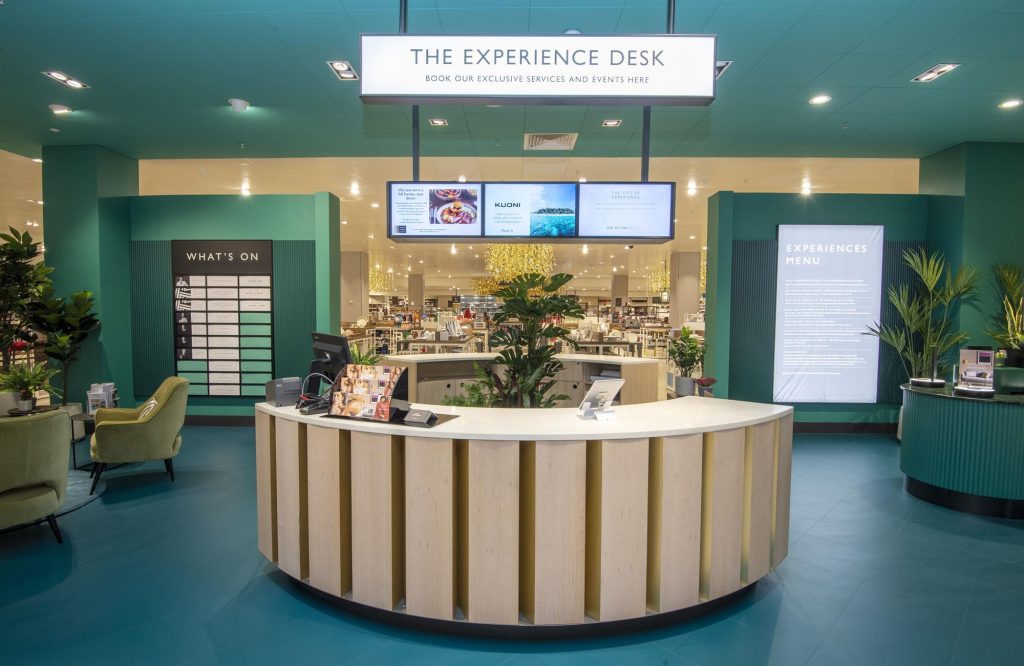
Never knowingly underselling customers, the visitor experience is at the heart of John Lewis’ sprawling store in Westfield – the flagship of the mall’s £600 million extension – and has its own Experience Desk where customers can curate their retail journeys. There’s also a style studio, discovery room, home design service and a roster of daily talks, cooking masterclasses and beauty treatments. Taking an experience-led approach, the store even has its own events coordinator.
Retail is changing, but today’s department store is as relevant as it ever has been in responding to customer needs. This shop offers something different. We’re bringing a new level of personalised, curated shopping to London.
Paula Nickolds, managing director of John Lewis
The store also has the first fully immersive Apple Smart Home experience in Europe, where customers can see HomeKit accessories – from lights and thermostats to home monitoring solutions – working in a realistic home setup. All of the staff have undergone National Theatre training and were chosen for their personality fit with the brand ahead of their retail experience. Staff specialising in brand experiences had to undertake an intensive three-week training course exploring how neuro linguistic programming can be used in the retail arena. The Virtual Sofa service in the John Lewis app uses AR tech to allow shoppers to see how sofas look in their homes before splashing out on them.
Is there a city or destination that you know well? The WXO is building the world’s first experiential travel guides, created by and for experience designers. To add your city, fill out our WXO Experience Safari form here.

